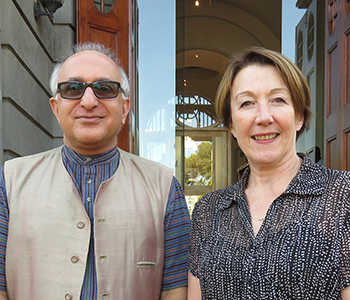Latest News Archive
Please select Category, Year, and then Month to display items
12 January 2024
|
Story Nonsindiswe Qwabe
|
Photo Sonia Small
 Since joining the UFS in 2008, Dr Grey Magaiza has worked extensively on approaches that can foster the socio-economic transformation of societies.
Since joining the UFS in 2008, Dr Grey Magaiza has worked extensively on approaches that can foster the socio-economic transformation of societies.
“The future should be one where communities can decide on their development agenda and futures. That’s the most important for me.” Dr Grey Magaiza, Deputy Director of the Centre for Gender and Africa Studies (CGAS) and Head of the Community Development programme on the Qwaqwa Campus, is passionate about capacitating communities to be agents of change and advancement. His vision for the future emphasises the empowerment of communities to take charge of their development by actively participating in decision making and the implementation of development projects that can improve their lives.
Since joining the UFS in 2008, Dr Magaiza has worked extensively on approaches that can foster the socio-economic transformation of societies. Over the years, he has crafted his research speciality into one that he is most proud of – being an interdisciplinary scientist immersed in the development of communities.
“I’m in a fortunate position of researching what I like. I say ‘fortunate’, because I’ve taken the time to understand what I’m passionate about, which is the overall field of rural livelihoods and livelihood futures – in short, community development. My research starts from an engaged university, understanding the elements that a university must use to enhance transformation and relevance to its immediate community in terms of development.”
One of the ways he has done this is by looking at social entrepreneurship as a development approach for young people in a rural setting. Through workshops with non-profit and civic organisations in Qwaqwa, Dr Magaiza has been helping these organisations to map out their needs and actively meet them through the involvement and support of external role players.
“We understand that communities are part of the national development agenda, but even that national agenda respects community knowledge and intentions and allows communities to shape their identity. A critical enabler of this is community organising. You bring back the capacity in communities to have dialogues on issues affecting them as spaces for engagement, knowledge exchange, and for people to just talk about their way forward.”
By enabling communities to define their development agenda, they can address their specific needs, challenges, and aspirations, he said. “When I look at livelihood futures, it’s quite an exciting aspect of my work – it’s like looking into a fortune tellers’ globe, because you’re not deciding for communities what they should do, but the communities themselves take those decisions.”
Andrew Mellon Foundation renews ongoing support for UFS projects
2017-04-10
 Dr Saleem Badat and Annemia van der Heever.
Dr Saleem Badat and Annemia van der Heever.The University of the Free State (UFS) was first awarded a grant by the Andrew W Mellon Foundation (AWMF) in 2015 to fund several projects between 2015 and 2016 under the International Higher Education Strategic projects fund. The programme’s director, Dr Saleem Badat, visited the UFS on 23 March 2017 as part of his annual first-quarter feedback sessions, with not only the UFS but other universities around the country that benefited from the programme. Top of the agenda was a meeting with principal investigators of projects funded by the foundation, to discuss the UFS’s institutional priorities for funding, alongside the university’s management, to discuss possible intra-institutional projects to be undertaken with other universities.
During his visit, Dr Badat met with Prof Nicky Morgan, UFS Acting Vice-Chancellor and Rector, as well as the AWMF representative, Annamia van der Heever, Director: Institutional Advancement. He discussed future plans with managers of the Programme for Innovation in the Artform Development, #Movements project, Inclusive Professoriate Grant and the Curriculum reform programme which involved seven other universities.
The AWMF, through its projects, is instrumental in developing and maintaining strong higher education institutions that produce knowledge and high-quality graduates, and advances social justice. The projects further aim to deepen and broaden public understanding and support for the arts and humanities, diversity and inclusion. “The Foundation each year presents universities with wonderful opportunities to improve teaching, learning and research in the humanities. We are working hard with the Faculty of Humanities on possible submissions for 2017,” said Van der Heever.
During 2017 between $10.8 million and $12 million will be available for grants by the Foundation’s International Higher Education and Strategic Projects programme. The Vice-Chancellor’s Office will continue to serve as a contact point and administrative support for UFS projects currently funded by AWMF. Institutional Advancement will assist project leaders to draft submissions to the Foundation this year and in the future. In 2018 AWMF will celebrate 30 years of involvement in supporting higher education in South Africa.